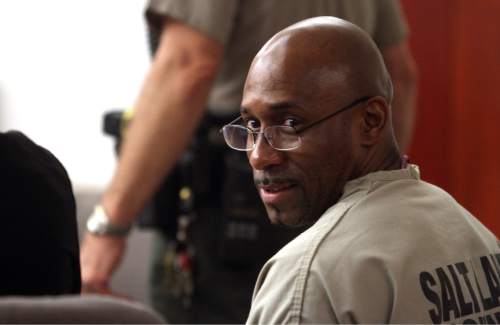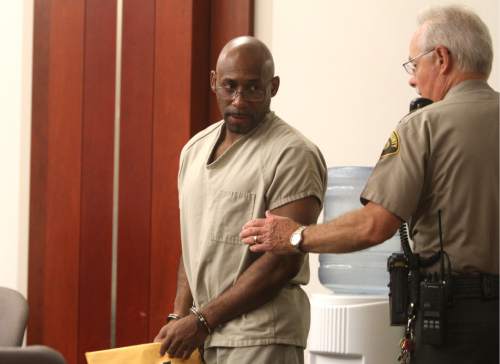This is an archived article that was published on sltrib.com in 2015, and information in the article may be outdated. It is provided only for personal research purposes and may not be reprinted.
As a man once accused in a Salt Lake City cold-case murder was sentenced for drug crimes Friday, he told the judge it was the looming murder case that drove him to drugs.
"I had a job and I lost it because of the murder charge," Thomas Pennington told 3nd District Judge Vernice Trease. "That's why I relapsed. I was six years sober."
Pennington, 49, pleaded guilty in May to two counts of second-degree felony possession or use of a controlled substance, along with a third-degree felony count of failure to register as a sex offender in connection with a Missouri child molestation case.
He admitted in court papers that he had methamphetamine and heroin in his Salt Lake City hotel room in October 2014 — seven months after he had bailed out of jail and was awaiting trial for the 1986 strangling death of his ex-girlfriend, 20-year-old Patricia Ramirez.
Pennington was charged with the murder in 2011, but the homicide case was dismissed in April without prejudice — meaning it can be filed again — so authorities could investigate "potential alibi evidence."
Defense attorney Michael Sikora asked Trease on Friday to sentence his client to a year in jail for the drug crimes, but asked that he be given credit for the time he had already spent waiting behind bars. He said Pennington was working in jail to better his situation, and has been in an addiction recovery program.
"He relapsed on drugs," the defense attorney said. "This is a problem he has dealt with for a long, long time. But this time around, he's going to be on a tighter leash ... He doesn't have a murder case hanging over his head this time around. There is a great deal of stress that has been taken off his back."
But prosecutor Vincent Meister asked the judge for a year in jail without credit for time served, and expressed concern that Pennington had committed crimes while awaiting trial for murder.
"With something as serious as that hanging over his head, what does he do? Starts dealing drugs," Meister said. "He gets out, and he's looking at a potential murder charge and he's out dealing drugs."
Pennington told the judge he never sold the drugs to others, but was "associating with the wrong people at the time."
Trease ultimately ordered Pennington to serve 365 days in the Salt Lake County Jail, but did give him credit for 235 days that he had already served. The maximum penalty for the second-degree felonies is a one-to-15 year prison sentence.
Prosecutors charged Pennington with the homicide in June 2011 after two witnesses told police he had made statements about the slaying at a party on July 8, 1986.
A third witness, Joel Murray, told officers that he drove Pennington and two others to a spot on Bonneville Boulevard above Memory Grove where they disposed of a heavy, wrapped package.
During a preliminary hearing in 2012, the driver, Murray, said Pennington, had asked him if he wanted a look inside and said, "I have this secret; do you want to know what it is?"
"I got this bad feeling, this weird feeling," Murray testified, adding that he didn't want to know Pennington's secret. "... I believed it was a human body."
When Ramirez's body was found July 13, 1986, police said her shirt was open and her bra torn in half. The other half was wrapped around her neck and had apparently been used to strangle her, a medical examiner said.
Meister said Friday that authorities are still investigating Pennington's alibi. His defense team claims that payroll records show Pennington was working 40 hours a week in Kansas City, Kan., at the time Ramirez was killed.
Meister said the alibi evidence hasn't yet been verified by prosecutors — but it hasn't been disproved either. No other suspect has been charged in connection to Ramirez's murder, the prosecutor said.
Twitter: @jm_miller





